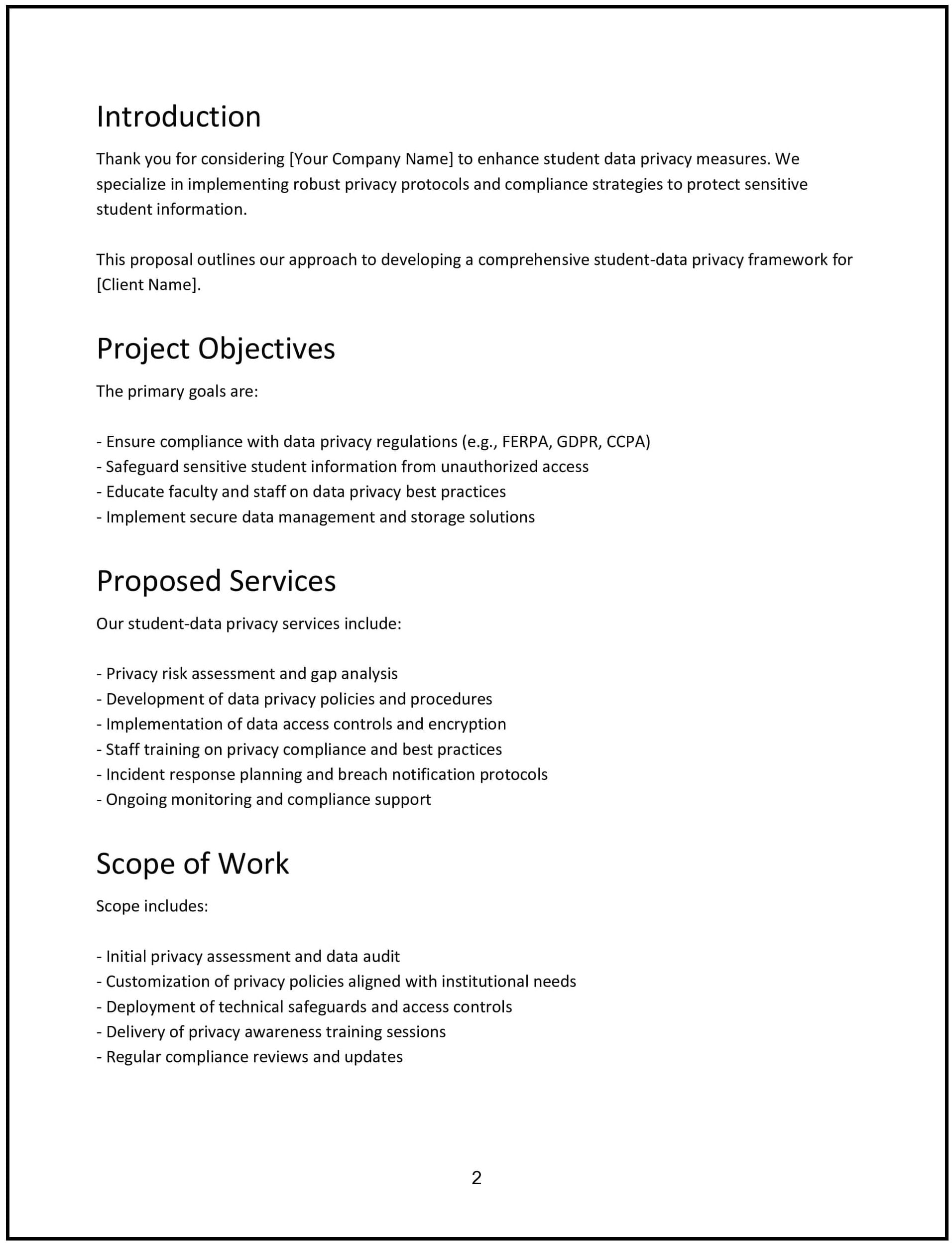Got contracts to review? While you're here for proposals, let Cobrief make contract review effortless—start your free review now.

Customize this template for free
Customize this free student-data privacy proposal with Cobrief
Open this free student-data privacy proposal in Cobrief and start editing it instantly using AI. You can adjust the tone, structure, and content based on the institution type, data systems, and compliance goals. You can also use AI to review your draft — spot gaps, tighten language, and improve clarity before sending.
Once you're done, send, download, or save the proposal in one click — no formatting or setup required.
This template is fully customizable and built for real-world use — ideal for pitching data privacy and compliance services to K–12 districts, universities, edtech vendors, or school boards. Whether you’re offering a policy overhaul, system audit, or staff training, this version gives you a structured head start and removes the guesswork.
What is a student-data privacy proposal?
A student-data privacy proposal outlines your plan to review, protect, and manage how student information is collected, stored, and shared across systems. It typically includes the scope of work, regulatory context (e.g., FERPA, COPPA, GDPR), technical safeguards, training components, and timeline.
This type of proposal is commonly used:
- When schools or universities are updating privacy practices or preparing for audits
- In response to compliance gaps, vendor risk, or new tech adoption
- To help align privacy policies and technical controls with legal standards
It helps institutions minimize legal exposure, build family trust, and strengthen internal data governance.
A strong proposal helps you:
- Translate complex privacy rules into clear, actionable steps
- Identify risks across systems, vendors, and user practices
- Provide scalable tools, training, and documentation
- Reinforce long-term accountability — not just one-time fixes
Why use Cobrief to edit your proposal
Cobrief helps you build a clean, convincing proposal faster — with live editing and smart AI tools that save time and sharpen delivery.
- Edit the proposal directly in your browser: No need for extra formatting or design tools — just open and write.
- Rewrite sections with AI: Adjust language for school leaders, IT directors, or compliance officers with a single click.
- Run a one-click AI review: Let AI flag vague policies, missing controls, or overcomplicated explanations.
- Apply AI suggestions instantly: Accept changes line by line or apply all edits across the proposal.
- Share or export instantly: Send your proposal through Cobrief or download a polished PDF or DOCX file.
You’ll go from draft to delivery faster — and with more confidence.
When to use this proposal
Use this student-data privacy proposal when:
- Proposing a data privacy audit or policy rewrite for an educational institution
- Offering compliance support aligned with FERPA, COPPA, GDPR, or state-level regulations
- Supporting schools adopting new platforms, assessments, or third-party apps
- Training staff and vendors on responsible data handling and security practices
- Helping institutions prepare for accreditation, inspections, or parental inquiries
It’s especially useful when schools are facing digital growth without a strong privacy foundation.
What to include in a student-data privacy proposal
Use this template to walk the client through your process, safeguards, and deliverables — in clear, plain-smart language.
- Project overview: Describe the institution’s current challenges or compliance risks and how your work will address them.
- Scope of review: Define what’s included — privacy policies, consent forms, data retention practices, vendor contracts, platform audits, or breach procedures.
- Regulatory alignment: Reference relevant laws — such as FERPA, COPPA, GDPR, or state mandates — and explain how your process ensures compliance.
- Risk identification: Explain how you’ll evaluate exposure across systems, devices, and access points — from SIS to edtech tools.
- Technical controls: Outline recommendations or assessments related to encryption, access control, data minimization, or user provisioning.
- Policy and documentation: Clarify how you’ll draft or revise key documents — such as privacy notices, staff guidelines, and data-sharing agreements.
- Training and awareness: Describe staff workshops or admin training sessions focused on practical, school-specific data handling practices.
- Timeline and milestones: Provide a phased timeline — covering audit, recommendations, drafting, training, and final review.
- Pricing: Present your fee model — project-based, per-site, or tiered by scope. Include optional services like policy monitoring or vendor vetting.
- Next steps: End with a clear CTA — such as reviewing current documents, scheduling a kickoff, or approving the scope.
How to write an effective student-data privacy proposal
This proposal should feel credible, manageable, and compliance-ready — especially for schools with limited tech or legal bandwidth.
- Speak human, not legalese: Avoid drowning the reader in statutes — focus on what they need to do and why it matters.
- Frame privacy as practical: Emphasize student safety, institutional trust, and operational clarity — not just risk avoidance.
- Tailor by education level: Adjust examples and tools based on whether you’re supporting K–12 districts, higher ed, or charter systems.
- Reinforce sustainability: Show how your work supports long-term practices — not just short-term fixes.
- Build confidence, not fear: Position yourself as a partner, not a critic — your role is to help them feel more secure.
- Close with direction: Make the next step simple and actionable — don’t leave them guessing.